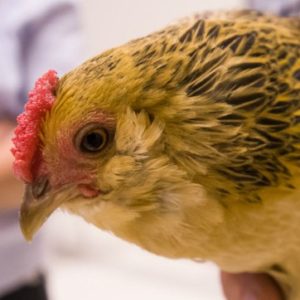Backyard flock owners: Beware of virulent Newcastle disease
- 2018-06-05
- By cfarrand
- Posted in 4-H Youth Development, Agriculture, Food and Health, STEM
By Ragan Adams, DVM, coordinator, Veterinary Extension Specialist Group at Colorado State University
It’s not the avian flu, but a condition known as virulent Newcastle disease is back in the United States. The disease, which affects wild birds and domestic poultry, has not been found in commercial poultry in the U.S. since 2003. But it was recently diagnosed in backyard chickens in Los Angeles and San Bernardino counties in California.
Virulent Newcastle disease, or vND, is a contagious viral disease affecting the respiratory, nervous and digestive systems of fowl. It is spread by direct contact with the droppings or respiratory discharges of infected birds. Because the virus can live for a long time in the environment and can be spread by objects such as shoes, clothing and equipment, other flocks in close proximity can quickly become infected.
Resources
USDA fact sheet on virulent Newcastle disease
Track the spread of the disease, updated by USDA Animal and Plant Health Inspection Service
USDA biosecurity for birds on exotic Newcastle disease, in English and Spanish
Biosecurity for birds, from USDA Animal and Plant Health Inspection Service
The disease is almost always fatal, and many birds die suddenly before developing observable symptoms.
No food concerns for humans
 Fortunately, vND does not create a food safety concern. No humans have ever been diagnosed with Newcastle disease after eating properly cooked poultry products. In very rare instances, people working directly with these sick birds can become infected with mild symptoms like conjunctivitis, or pink eye.
Fortunately, vND does not create a food safety concern. No humans have ever been diagnosed with Newcastle disease after eating properly cooked poultry products. In very rare instances, people working directly with these sick birds can become infected with mild symptoms like conjunctivitis, or pink eye.
The disease typically occurs outside of the U.S. and its territories. But if a large outbreak were to occur in this country, it has the potential to have significant poultry health and economic impacts.
In late 2002 in California, the disease spread to commercial poultry from flocks of illegally imported game fowl. More than 3.5 million birds at over 2,100 sites in the United States were affected, and it took health officials more than one year to eradicate it, at a cost to the federal government of over $180 million.
Required reporting, testing for vND
This disease, and highly pathogenic forms of the avian flu, are considered to be serious enough that the U.S. Department of Agriculture tests flocks, imported pet and game birds, and migratory water birds as part of an ongoing surveillance program.
When it affects commercial poultry, health and government officials are required to report the disease to the World Organization of Animal Health. This, in turn, has the potential to impact international trade in poultry and poultry products.
What should you do, if you own backyard chickens?
It’s important to keep an eye on your birds, since early identification is important, and so steps to eradicate the disease can be taken immediately. Birds may die suddenly without any obvious signs of disease or show a variety of symptoms, including:
- Sneezing, gasping, nasal discharge, coughing
- Greenish, watery diarrhea
- Depression, muscular tremors, droopy wings, walking in circles and complete paralysis
- Partial to complete drop in egg production and thin-shelled eggs, and
- Swelling of tissues around the eyes and in the neck.
Backyard flock owners who have questions or concerns about the health of their birds should contact the Colorado State Veterinarian’s Office at 303-869-9130 or CSU’s Avian Health Program at 970-297-4008.
To protect flocks from infectious diseases, bird owners should follow these simple steps:
- Keep visitors to a minimum
- Wash hands and change your clothes after handling birds
- Clean and disinfect tools and equipment
- Keep a close eye on your birds
- Isolate birds returning from shows
- When in doubt, communicate early and often with state health officials
“All bird owners play an important role in disease prevention in Colorado,” said Keith Roehr, state veterinarian. “Basic biosecurity and simple disease prevention strategies can significantly reduce disease risks to your birds and protect the egg and poultry producers in our state.”

